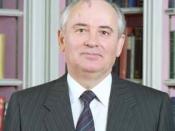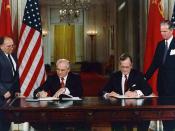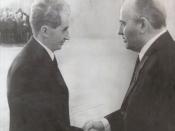The Soviet Union, officially established after the Russian Revolution of 1917 and the end of the Civil War in 1922 by Vladimir Lenin, finally came to its collapse in 1991 at the leave of the former Warsaw Pact Eastern European countries. Countless historians and even Russian nationals, have blamed the dissolution of the country upon Gorbachev, the leader who is said to have caused the domino effect of independence within the satellite states through his changing policies. Though a long history under the old Soviet system, where the hierarchy of soviets, ethnic federalism, state socialism and Communist Party dominance were imperative contributors, the essential and immediate reasons why the Eastern European countries sought to leave the Soviet Union in the first place is Gorbachev's political-social policy glasnost, economic plan perestroika, and the rise of nationalist diversity within the states.
The policy of Glasnost came into being towards the late 1980s, when Gorbachev began to promote an air of openness in discussions concerning historical and current issues.
Though this action was meant to push for reform and the people's support of it, the plan completely backfired because of what problems it brought into light. The cruelty of the Stalin era was exposed, as the genocides and purges (such as the Katyn massacre), was formally acknowledged by the government and Brezhnev's era of stagnation and corruption was also strongly condemned. Glasnost made Soviet leaders more susceptible to the outside media and foreign influences. The policy's unforeseen consequences included the massive upheavals that arose within the already unstable Eastern Europe, for nationalist spirits spread across the states. Ethnic tensions resurfaced, as seen in February 1988's massacres of Armenians in the Azerbaijani city Sumgait, since the government's repression for conformity among the states was lightened. Gorbachev had intended for Glasnost to be...


